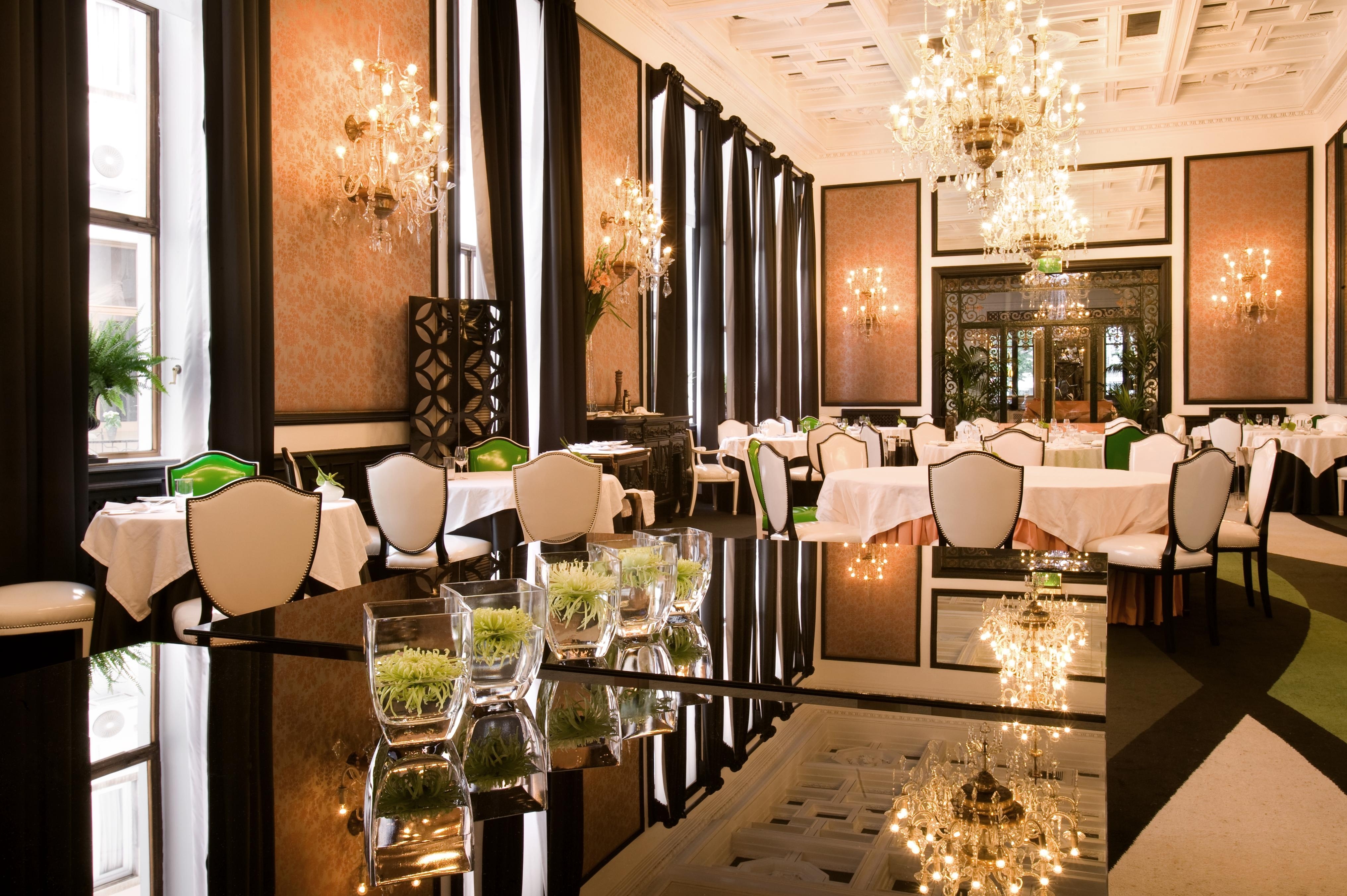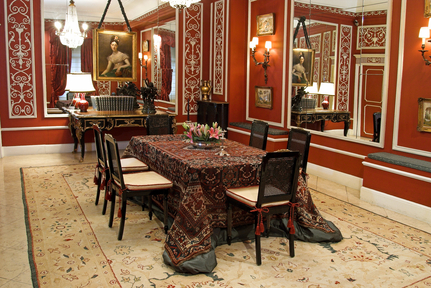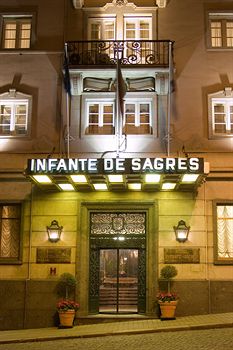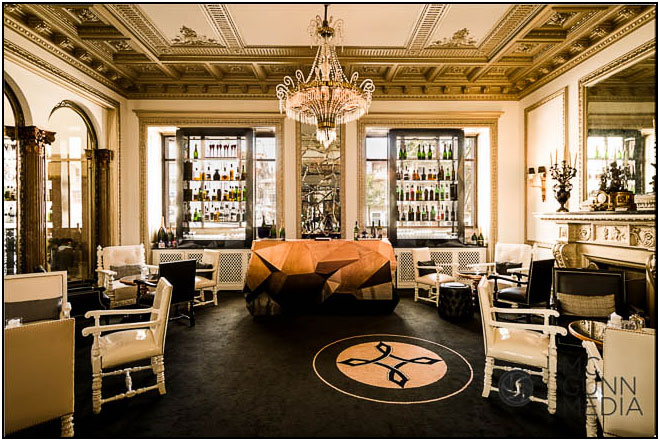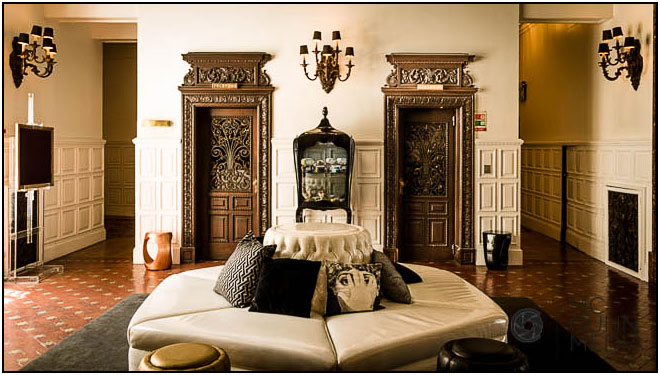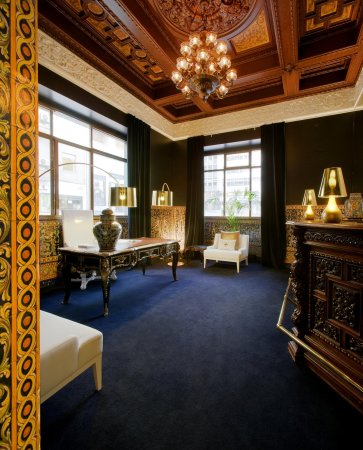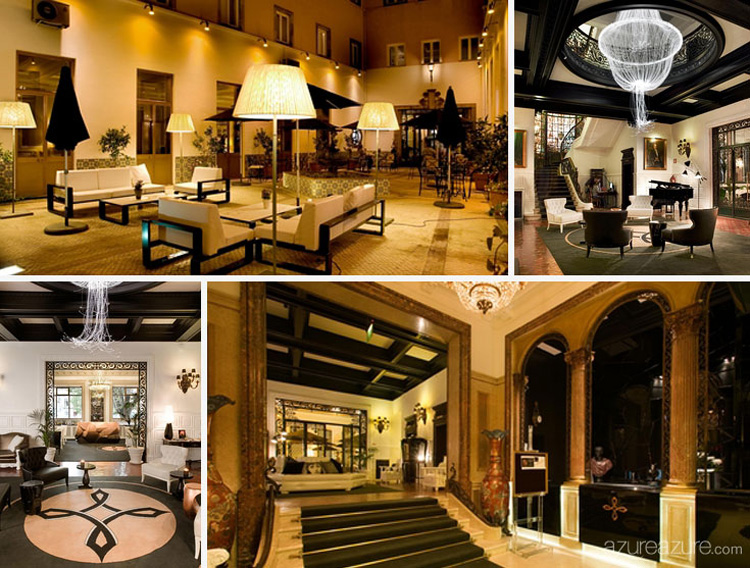Hotel Infante Sagres
Conference Room: Infantes
Praça D. Filipa de Lencastre, 62 - 4050-259 PortoConference Program
- April 28, 2017
- 09:00 - 09:30Participants Registration (Registration Desk)
- 09:30 - 10:30Welcome and Opening Remarks - Opening Workshop ~ Europe Exposed to Plural Observers: Past, Present and Future
- 10:30 - 11:00Coffee Break and Snacks
- 11:00 - 13:00Panel 1: Thinking Europe: Understandings of European Identity Formation and Inclusion/Exclusion Nexuses
- 13:00 - 14:30Lunch – Infante Sagres Restaurant
- 14:30 - 16:30Panel 2: Performing Identities and Assessing Multiculturalism in Intellectual and Literary Narratives: Post-Colonial Readings
- 16:30 - 17:00Coffee Break and Snacks
- 17:00 - 19:00Panel 3: Migration and Alterity Making Practices in Europe: Gender, Religion and the Geographies of Orientalism
- 19:00 - 19:45Welcome Drink Out in Porto
- 19:45 - 21:00Optional Social Dinner Out in Porto
- April 29, 2017
- 09:00 - 11:00Panel 4: Europe and the EU: Assessing the EU Crisis, the Politics of Europeanization and Claims of Normative Influence
- 11:00 - 11:30Coffee Break and Snacks
- 11:30 - 13:00Panel 5: Urban Transformations, Transition and Change in European Urban Image Construction
- 13:00 - 14:30Lunch – Infante Sagres Restaurant
- 14:30 - 16:30Panel 6: Performing Identities through Visual Narratives: Non-Normative Bodies, Corporeality and Violence in Theater and Visual Representations
- 16:30 - 17:00Coffee Break and Snacks
- 17:00 - 19:00Panel 7: Thinking Europe: Philosophy, Autonomy, Culture
- 19:00 - 19:30Concluding Remarks and Discussions
- 19:30 - 21:00Optional Social Dinner Out in Porto
- April 28, 2017
Europe Inside-Out: Europe and Europeanness Exposed to Plural Observers (7th Edition)
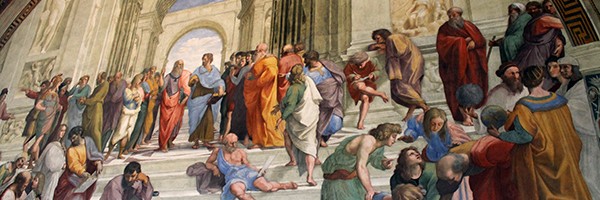
- Conference Description
- Participant’s Profile
- Registration and Fee
- Social Activities and Publication
- Important Dates
- Venue and Directions
- Conference Program
- Panel 1
- Panel 2
- Panel 3
- Panel 4
- Panel 5
- Panel 6
- Panel 7
The 7th Euroacademia International Conference
Europe Inside-Out: Europe and Europeanness Exposed to Plural Observers
28 – 29 April 2017
5* Hotel Infante Sagres, Porto, Portugal
Conference Description:
Europe became in the 20th century an elaborated yet contested notion as a particular field of European studies emerged, and extensive and diverse research was directed recently towards an intensified search for what Europe is about. The creation of the European Union made things even more specialized and increased the stake of methodological rigor as more and more Europeans are affected by the decisions taken in Brussels. The number, diversity and quality of research projects focused on European issues is unprecedented, yet, as it is usually the case with specialization, it gradually led to discursive communities that rarely meet and debate their approaches in open floors together with peers from other continents, disciplines, academic traditions and cultures. It is the aim of this conference to build a bridge among specialists from different backgrounds, regions, academic traditions and cultures that share a common interest in studying and addressing Europe as a reflexive concern.
The 7th Global Conference ‘Europe Inside-Out: Europe and Europeanness Exposed to Plural Observers’ aims exactly to refresh a broader approach and understanding of Europe by enlarging the platform of regular conferences and workshops for a wider arena of participants and disciplinary backgrounds in order to put on stage a worldwide monadology for such concerns. It is an intellectual event that addresses constructive thinking. The conference aims to enable critical alternatives to the disciplinary orthodoxy by creating a framework for interaction and dissemination of diversity that has to become once more a European trademark. The conference also aims to become a constructive confrontational space for alternative methodologies, provocative puzzles, inter, multi and trans-disciplinary understandings for wider and also for thinner specialized issues of concern on or about Europe of today and tomorrow. In a way, the conference stands to become a moment of return to the European specificity of critical self-understanding through dialogue and debate with all the discursive or narrative traditions that directly or indirectly constitute Europe in its plural facets.
What is Europe and its place in the world? Is there something particular that sediments in time a ‘European way’? How does Europe see itself and how do others see it? Is Europe inclusive or club-based exclusive? Is Europe becoming a normative power or just envisages itself as one? Is the European multiculturalism a fact or an ideal? Is the European Union a reflection of Europe or an appropriation of it? Is European unity a fact or an illusion? Is Europe heading towards a post-national cosmopolitan order or returning to a Europe of nations? What is the European identity? These are just few questions out of an enormous space for inquiry that are to be addressed and confronted within the topic of the conference.
The Euroacademia International Conference ‘Europe Inside-Out: Europe and Europeanness Exposed to Plural Observers’ became a regular event to take place in every year in a different European location in order to immerse participants in the European culture and identitarian loci. After six successful editions – in Vienna, Paris, Prague, Athens, Barcelona and Nice – Euroacademia moves the stage of reflection, sharing, dialogue, debate and research dissemination on Europe to Porto. Join us!
Participant’s Profile
The conference is addressed to academics, researchers and professionals with a particular interest in Europe, Europe related and European Union topics from all parts of the world. As the nature of the conference is intended to be multidisciplinary in nature, different academic and intellectual backgrounds are equally welcomed. Cultural approaches, political studies, critical studies, out of mainstream approaches and artistic/literary contributions to the better understanding of Europe in its past present and future dimensions are all equally welcomed. Euroacademia favors inclusive alternative and innovative thinking proposals and non-mainstream methodologies.
Post-graduate students, doctoral candidates and young researchers are welcomed to submit an abstract. Representatives of INGOs, NGOs, Think Tanks and activists willing to present their work with impact on or influenced by specific understandings of Europe and/or the European Union are welcomed as well to submit the abstract of their contribution.
Abstracts will be reviewed and the participants are selected based on the proven quality of the abstract. The submitted paper for the conference proceedings is expected to be in accordance with the lines provided in the submitted abstract.
Registration and Fee
Registration process is closed
The Participation Fee Includes:
- the registration fee
- official invitation
- full access to the conference proceedings
- participant’s dedicated package with all the materials for the conference
- eligibility for inclusion in the conference proceedings published volume
- a copy of the electronic volume
- access to Euroacademia discussion group and newsletters
- coffee brakes with snacks and refreshing drinks for all the duration of the conference
- 3 course lunch on 28th of April 2017 at the 5* Restaurant Infante Sagres
- 3 course lunch on 29th of April 2017 at the 5* Restaurant Infante Sagres
- welcome drink
- certificate of attendance
- access to the optional social program
Unfortunately, Euroacademia has no available funds for covering transport and accommodation to/in Porto. Participants are responsible for securing funding to cover transportation and accommodation costs during the whole period of the conference. Official invitation letters can be sent by Euroacademia to the financing institution to confirm the selection and participation in the conference upon request.
Social Activities and Publication
A specific spot in the conference program will be dedicated to social networking and therefore all the participants interested in setting or developing further cooperation agendas and prospects with other participants will have time to present and/or promote their project and express calls for cooperation.
A specific setting (Social Corner) for promotional materials connected with the topic of the conference will be reserved for the use of the participants. Books authored or edited by the participants can be exhibited and promoted during the whole period of the conference and can also be presented within the conference package based on prior arrangements.
Photos and videos will be taken during the conference and the organizers will consider through the participation of selected presenters or members of the audience that the agreement for being photographed or filmed during the event was granted through registration to the event. Please notify the organizers in written form prior to the the event if you are a confirmed participant and would prefer otherwise.
An optional dinner and a social event will be organized for the second evening of the conference in a typical Porto cuisine restaurant, as optional program for the willing participants. The social dinner will be held based on participant’s confirmation and will be covered individually by participants on spot.
Publication:
Selected papers are eligible to be published in an electronic volume with ISBN or paperback thematic volumes after the confirmation of the authors and a double peer-review process based on an agreed publication schedule. All the papers selected for publication should be original and must have not been priory published elsewhere. All participants to the conference will receive a copy of the volume.
Specific selected papers will be also eligible to be published in CEJISS (Central European Journal of International & Security Studies)
About CEJISS
Formally launched in January 2007, CEJISS is designed as a double-destination scholarly bridge. The first bridge was constructed with Central Europe (Czech Republic, Hungary, Poland and Slovakia) in mind, focusing on increasing the audience for Central European scholars. In this regard, CEJISS is making a substantial impact as each issue attracts attention in some 45,000 people in nearly 160 countries. However, CEJISS is not Central European centric and invites scholars from around the world to contribute. This has meant that just as Central European scholars now have an easier time gaining a footing outside of the region, so international scholars also have an easier time getting in and making an impact here. With a mere two decades separating our times from the ‘darker’ Cold War years, CEJISS aims to contribute English language perspectives to the peoples of Central Europe and give the latter the amplification their research deserves.
| Important Dates | |
|---|---|
| 1st of March 2017 | Deadline for Submitting Panel Proposals |
| 15th of March 2017 | Deadline for Submitting Paper Proposals |
| 16th of March 2017 | Final notification of acceptance |
| 20th of March 2017 | Sending the Registration Form |
| 25th of March 2017 | Payment of the conference fee |
| 15th of April 2017 | Sending the draft paper to be uploaded on the conference website |
| 20th of April 2017 | Publication of the conference program and uploading the draft papers on the website |
| 28th of April 2017 | The conference commences at 9.00 am |
Venue and Directions
The conference will take place in the beautiful and inspiring Porto, in the conference premises of the high standards 5 stars Hotel Infante Sagres located in the heart of Porto’s historical district, two steps away from the city’s UNESCO World Heritage area.
5* Hotel Infante Sagres – Porto
Praça D. Filipa de Lencastre, 62
4050-259 Porto, Portugal
Tel: +351 223 398 500
Fax: +351 223 398 599
[email protected]
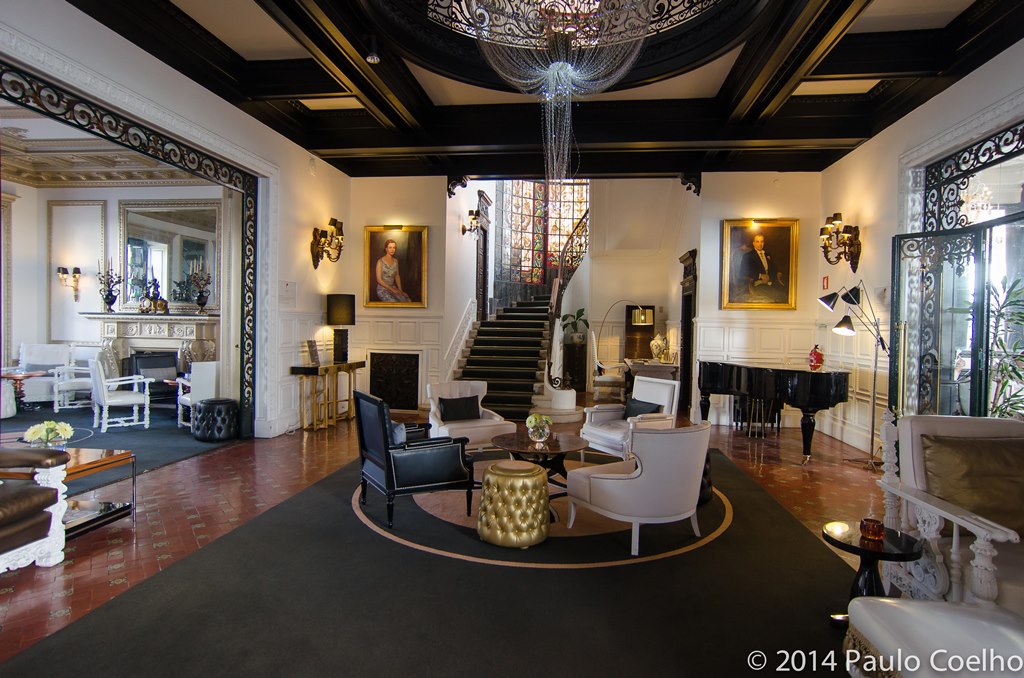
Hotel Infante Sagres was built in the 1950s and is appreciated for its sophisticated interior design, intimate atmosphere and location in the historic center of Porto, being considered one of the most important and renowned hotels in the city of Invicta. Throughout its history, it has contributed significantly to the recognition of Portuguese hospitality by hosting several internationally renowned personalities such as the Dalai Lama, the Kings of Norway, Bob Dylan and John Malkovich. Finding itself on the “Small Luxury Hotels of the World” list, a certified selection of the most exquisite and luxurious hotels in the world, Infante Sagres aims to welcome visitors with the charm of personalized service and the intimacy of a private home. The Hotel Infante Sagres stands out by allying a Neo-Baroque atmosphere to an irreverent contemporary style.
Porto is the second largest city in Portugal and one of the oldest European centers. Placed along the Douro river estuary in Northern Portugal, Porto’s historical core was proclaimed a World Heritage Site by UNESCO in 1996. The western part of its urban area extends to the coastline of the Atlantic Ocean. It is of course the home of the famous Porto wine, since the caves of Vila Nova de Gaia, were responsible for the packaging, transport and export of the fortified wine. In 2014, Porto was elected The Best European Destination by the Best European Destinations Agency. Porto is a beautiful city that inspires through architectural diversity, hospitality of its people, amazing food and a vivid creative and artistic life. From the Sé cathedral terrace and Gaia’s hilltop Jardim do Morro, the city is reduced to postcard format: a colorful tumbledown dream with soaring bell towers, extravagant baroque churches and stately beaux arts buildings. The history is pulsating through alley-woven Ribeira, the random splashes of creativity in street art and azulejos, the musty cellars of big-name port lodges, the design scene, the high-spirited nightlife,and the glorious food give Porto a unique atmosphere to be explored.
Oporto airport is 11km (7 miles) north of the center of the city. It is a modern airport that was expanded and refurbished in 2001, and in 2007 won the “3rd Best European Airport” award from Airport Council International. The easiest way to get to the center is by metro (take the Purple Line), although you may also choose the convenience of a taxi, which should cost between 15 and 20 euros and take between 20 and 30 minutes.
HERE
Conference participants are responsible for arranging the accommodation and travel to Porto.
Conference Program
The Conference Agenda is available in the right sidebar.
The extensive conference program with abstracts and available draft papers will be accessible below after upload by clicking on the panel number tabs and individual presentations. Due to technical reasons, a short delay occurred and the complete program will be available today. We apologize for the inconvenience.
Thinking Europe: Understandings of European Identity Formation and Inclusion/Exclusion Nexuses
- Europe and the West: Two Mutually Exclusive Concepts?This fusion of the conservative concept of Europe as a cultural community and the liberal concept of the West as a political community was very useful in the context of the early Cold War to justify and consolidate the Atlantic alliance. However, in the long run it put the formation of a European identity and attachment to 'the West' in a competitive relationship. Since both 'Europe' and 'the West' were defined by the same markers, attempts to promote one concept usually came at the expense of the other. European identity formation therefore required, at least, to an extent, a denial that Europe and North America shared the same historical heritage and the same political values.Jasper Trautsch, University of Regensburg, Germany
- European Culture as a MirageIs there a European culture? For this question research is done in literature about the history of the United Kingdom, France and Germany in the 20th century. How do politicians, journalists and scientists think about Europe? Can we speak of European traditions and mentality? Or, are national traditions still dominating? Which kind of perceptions exist about Europe?Diederick Slijkerman, University of Leiden, The Netherlands
- “Europe” in the Minds of Eastern European IntellectualsI wish to offer a perspective on the idea of “Europe” that is not self-celebratory and self-evident. I argue that scholarly engagements with the notion of “Europe” need to integrate historical phenomena and episodes that are usually marginalized and are more in favor of “discovering” the “true essence” of Europe in an uncritical manner. In my paper, I focus on four intellectual discourses of 'Europe' that can offer a more complicated, nuanced and historically accurate image of what “Europe” has stood for in various contexts and how it was discursively used by its many agents.Anamaria Remete, Murdoch University, Australia
- Europe as a ‘Self-Organizing Vertigo’: Patrimonial European Culture and Politicized IdentitiesIf there is a minimal specificity of Europe that could be defended, Castoriadis has argued throughout his work, it is precisely the lack of an unquestionable point from which a European distinctiveness could be reified. By historical contingency, for Castoriadis, it was in Europe that a genuine interest in the others as others emerged in the frame of the project of social and individual autonomy originated in ancient Greece and reasserted by the European modernity. This presentation looks at the patrimonial/instrumental nexus in European identity making practices and narratives.Emanuel Crudu, Euroacademia (Paris, Lucca & Brussels)
Performing Identities and Assessing Multiculturalism in Intellectual and Literary Narratives: Post-Colonial Readings
- Europe And Englishness, Identification And Difference In D.H. Lawrence’s American WritingsLawrence clearly finds it wrong to impose European consciousness on aboriginal American peoples - the Aztec, the Maya, the Inca. Yet, as my argument will demonstrate, he nonetheless believes that the white and dark modes of consciousness in America resist unification. He emphasizes the differences between the local Americans and the Europeans and thus points out to the themes of individuation, heterogeneity and divergence. The Mexican Indians are different in their concepts of time, distance and money; dance and music and especially in their profound sense of religion. Despite his profound subjective engagement and his strong will to identify, he feels frustrated by "Indian" sensibilities, by what he perceives as unassimilable otherness. Yet he maintains his belief that he finds in America the primal wisdom that Europe has lost. Mexico becomes his own infernal paradise of conflicts and contradictions.Aylin Bayrakceken Akin, Bilkent University, Ankara, Turkey
- Europe Seen through the Eyes of a HinduWhat Gandhi is trying to show us in his book is the picture of Europe seen from India, from a different cultural space. He is calling in question the superiority of the European civilization and trying to stress the risks which are implied in this Western world. The main goal of the paper is to present the Gandhian way of thinking about the European civilization and to try to give an answer to the question if all these ideas written more than 100 years ago got any relevance for Westerners, for the European man of the 21st century?Dezső Szenkovics, Sapinetia Hungarian University of Transylvania, Cluj-Napoca, Romania
- Regaining Original Identity and Change in Ayi Kwei Armah’s Osiris RisingIdentity and change are key issues to Ayi Kwei Armah, a prolific Ghanaian novelist. In his novel Osiris Rising (1995), he shows the interconnectedness between African identity and the reform of the educational system as a cure for the underdevelopment of the African continent. This novel is a continuity of previous attempts of African writers to underscore the relationship of Africa and African-Americans, who were taken into slavery long time ago.Benzahra Mustapha, Moulay Ismail University, Meknès, Morocco
- Cassidy and the Relief of the Stage Irish Trope: Boucicault’s Critique of the British Empireoucicault subtly critiques the British Empire by haunting the crucial scene of the siege at Lucknow with the specter of the Irish Famine, which reached one of its nadirs only ten years before this play was first performed. Though Boucicault’s work of refurbishing the Stage Irish trope incorporates the Irish into the whole of the British Empire, he ultimately suggests that any such space for Ireland is ambiguous at best considering the by no means forgotten violence of Ireland’s painful history as a colony.Vanessa Maramba, University at Albany, SUNY
Migration and Alterity Making Practices in Europe: Gender, Religion and the Geographies of Orientalism
- Geographies of OrientalismMy consideration of Islamophobia and Orientalism will take up the convergence of imperial expansion and state-building as it pertains to the figure of the Muslim in Europe. By tracing these discursive continuities and the ways in which Islam and Muslims are thought of, spoken about, and studied we can begin to parse through the connections between colonial projects, Orientalism, and Islamophobia, as well as the production, durability, and adaptability of such discourses.Mariam Banahi, Department of Anthropology, Johns Hopkins University / Visiting Research Fellow, Hamburg University, Germany
- Rethinking European Identity and Muslim DiasporasBy examining the different discourses in which religion is articulated in the European public space, my paper aims to reveal how religion enters today’s European public and how this entrance is regulated and redefined by the age old Islamophobic discourses. The discourses, which articulate the fear of Islamic religiosities, render a new border between Europe and its Islamic Others. It is usually the Christian values and the heritage of Europe that is either implicitly and in many cases explicitly evoked to proclaim the externality of European Muslims to Europe.Meyda Yegenoglu, Institute for Advanced Social Research, University of Tampere, Finland
- Forced Migration and Politics of Multiculturalism: Lack of Agency or Complacency?The politics associated with multiculturalism are often problematic for these so-called weakest members of minorities, for example, when considering the degree to which these members of a minority have agency - defined as the ability to act free of external constraints. It can be considered as a constraint any physical, psychological, financial, sexual and emotional pressure. This paper aims to identify the problematic nature of agency in circumstances where women and children use their culture to justify actions, within States adhering to a liberal political model based the recognition of individual rights.Marta Dell'Aquila, University of Paris 1 Panthéon Sorbonne Paris, France
- Europe and Its Non-Familiar Faces: A Study of Ghanaian Women Migrants’ Use of New Media for Identity and Belonging in Hamburg and LondonNew communication technologies are essential in navigating gendered, diasporic-cosmopolitan identities, and creating sites of belonging in the context of everyday life where many face racism, and exclusion from the broader society. New media open up possibilities of cultivating social networks, which are crucial in sustaining diasporic identity, and community, as well as creating alternative spaces for inclusion. However, little is known about the role of new media such as the internet in the maintenance, expression and advancement of identity especially when it comes to empowerment in marginalised communities.Ann Mabel Sanyu, University of Dortmund, Germany
Europe and the EU: Assessing the EU Crisis, the Politics of Europeanization and Claims of Normative Influence
- A Critical Realist/Discursive Institutionalist Approach on EuropeanizationThis paper, based on an elaborated conceptualization, tries to combine top-down and bottom-up aspects of the complex, multilevel EU policy and governance structures, yet it does not aim to go beyond the institutionalist frame, therefore it sees Europeanization as a normatively devised institutional project.Zoltan Grunhut, Centre for Economics and Regional Studies, Hungarian Academy of Science, Hungary
- The “Other” Outside the European Borders: EU, Turkey and RefugeesThus, this paper aims at analyzing the content of the deal signed between Turkey and the European Union, contextualize it in the light of international conventions, and relate it to a possible momentum in the accession process of the country, as well as with Turkey’s performance in terms of respect for Human Rights. Furthermore, it will be explored the way this strategy has been shaping European identity and the otherness of Turks and refugees outside the European border.Andre Pereira Matos, Universidade Portucalense - Portucalense Institute for Legal Research, Porto
- Contesting the European Union in Times Of CrisisDue to its role in the crises management, the EU has become a matter of political conflicts and a very salient theme in the media. Thus, the aim of the proposed paper is to analyse how the EU is contested in social media during the Greek bail-out crisis, as an episode of the Eurozone crisis, and during the peak period of the refugee crisis.Milica Pejovic, University of Trento, Italy
- Globalization and Foreign Policy in Southern EuropeFollowing a brief overview on the interaction between globalization theory and FP, as well as between FP studies and globalization, we will explore the analysis model, analysing these challenges on two different levels. Our claim is that Foreign Policy studies could be rendered more valuable and specific if they adapt to include globalization in its studies as a relevant variable, particularly if they do so in a systematic and comparative fashion.Pedro Ponte e Sousa, New University of Lisbon / IPRI (Portuguese Institute of International Relations)
- The European Union Law ImplementationThe implementation and enforcement of EU law is a challenge that requires greater emphasis on implementation in order to serve the general interest. The aim of this analysis is to demonstrate that, as the Member States are primarily responsible for the implementation of EU legislation, there is still a way forward in the efficiency of European law enforcement procedures.Maria Manuela Magalhães Silva, Universidade Portucalense Infante D. Henrique, Oporto, PortugalDora Resende Alves, Universidade Portucalense Infante D. Henrique, Oporto, Portugal
Urban Transformations, Transition and Change in European Urban Image Construction
- Building European Citizenship through Architecture: The Case of the “Hellenische Renaissance” in Theophil HansenThis paper probes this phenomenon of contradictory receptions of Hansen's work and relates the respective causes of it to its arresting representational aspect as opposed to its deeper philosophical ties to the multivalent concept of hellenism. Having been himself naturalized in neither of the two countries – i.e., Greece or Austria – Hansen granted through his architecture a sense of belonging to citizens of both. This was owing to the particular resilience of Hellenic architecture of adapting itself to diverse contexts and still remaining astonishingly new; also to its cosmopolitan basis in the multicultural hellenistic world of the Mediterranean.Irene (Rena) Fatsea, Architect, Architecture Historian, Greece
- European Photographic Surveys and Man-Altered LandscapesI will take as a starting point some European surveys of the 80s-90s to focus on this French project and on a similar kaleidoscopic vision provided in Italy by the public surveys Atlante 003 and 007 (Risk landscape, portrait of a changing Italy), in order to see how urban and suburban transformations are redefining European identities in the contemporary “glocal” context.Chiara Salari, University Paris Diderot – Paris 7 / Roma 3 University
- Troubles in Paradise: Heritage Between Urban Developers and Post-Transitional AmnesiaIn my presentation I’d like to tackle the subject of de/re/constructions strategies that Croatian artists (Renata Poljak, Jasenko Rasol, Bojan Mrđenović, Ana Opalić) are using in order to negotiate certain visual myths and stereotypes of local identity formation forced upon by dominant visual representation of “Croatian urban heritage”.Leila Topic, Zagreb Museum of Contemporary Art, Croatia
- Identity, Migration and Displacement in Art: Tracing the Articulation of Franco-Belge and Franco Colonial Trauma through Architecture in ArtThrough examining the creation of meta-historical narratives of trauma in the artwork of two artists, I seek to understand the condition of colonialism expressed in contemporary art in the Franco context. With a specific interest in architectural motifs, this proposed contribution looks at constructed spaces in transgressing the colonial experience and the making of a post-colonial identity.Suzannah Henty, Panthéon-Sorbonne Paris 1
Performing Identities through Visual Narratives: Non-Normative Bodies, Corporeality and Violence in Theater and Visual Representations
- Legibility of Non-Normative Body Images in TheaterMy research focuses on the role of the body in the formation of an identity; and more specifically on non-normative body images. How do we read gender-specific body images, both in theater and in daily life? What reflexes have we developed in the interpretation of these body images? How can we break through normative frameworks of gender representation to achieve new interpretations of gender-specific body images? How do I, as a performer, respond to these interpretative reflexes and expectation patterns? I would like to exemplify these topics in a performance-lecture, based on the gender neutral character of my latest performance 'Always The Tragic'.Neal Leemput, Artist/Researcher, Royal Conservatoire of Antwerp, Belgium
- Performing Identities: The Case of Helena AlmeidaOur aim is to provide a comprehensive analysis of Almeida's work through a careful selection and description of some of her most representative images. Simultaneously, we propose to offer contextualization and engagement with Almeida's own statements on her intentions, critically examining several positions taken by the artist in different occasions.Miguel Mesquita Duarte, Institute of Art History, Faculty of Social Sciences and Humanities, Universidade NOVA de LisboaBruno Marques, Institute of Art History, Faculty of Social Sciences and Humanities, Universidade NOVA de Lisboa
- A Genealogy of Violence and Its ImageThis paper explores a genealogy in the role of violence and the image. The main focus of this paper considers both the moral insights found in phenomenological perceptual experiences from Maurice Merleau-Ponty and postphenomenological reflections of violence and its image through Jean Luc Nancy. Rather than tracing a steady curve and the evolution of violent images from an art historical sense, the translinguistics of Mikhail Bakhtin guide the genealogy in examining the isolation of various scenes of violence and its different roles within original carnivalesque themes and motifs and their transformation into new scenes with new roles in the modern, existential image.Gale Richardson, Institute for Doctoral Studies in the Visual Arts, Portland, Maine, USA
- Understanding National snd Political Identity in Germany and Soviet Russia through TheatreThis paper critically evaluates the role theatre plays in forming or constructing identity in the nation states of Russia and Germany, from the early Soviet period to the Second World War. The playwrights throughout this piece formed their theatrical practice during times of conflict and social upheaval. This clash of politics and art forms the basis of this paper.Hannah Meiklejohn, UWTSD / Lampeter University, UK
Thinking Europe: Philosophy, Autonomy, Culture
- European Historicism Out of Fashion?Instead of discounting the European historicism as an obsolete “fashion”, I will try to make use of it in the analysis of the concept of “culture” in contemporary European philosophy. I will focus on the particular version of historicism, imbedded in the neo-Kantian philosophy of culture. This version which I term as “cultural historicism” appeared in the 20th century political philosophy thanks to Sergius Hessen, one of the intellectual inspirers of the so-called “Warsaw School of Historians of Ideas” (Walicki 2010).Natalia Danilkina, , The Dutch Research School of Philosophy (OZSW), The Netherlands
- The Curse of Exemplarism Edmund Husserl on the German Nation and EuropeContrary to what is mostly taken for granted, i.e. that nationalism and universalism mutually exclude each other, one can observe here a very peculiar marriage between two seemingly opposed positions. In my paper, I want to investigate this problematic relationship mainly through Max Scheler and Edmund Husserl.Christian Sternad, Husserl Archives, KU Leuven
- Germany, Heidegger and Decolonisation: A Critique of Cosmopolitanism and the Place Europe in a Pluriversal World OrderBy exploring and analysing the significance and emergence of the phenomenological project of Heidegger, it aims to show that phenomenology is a unique discipline that emerged in confrontation with “the West” in the spirit of a decolonial project from the very outset. Decolonial here refers to the place-oriented (topological) studies which articulates the concept of place as that in which meaning and human beings historically come to one another.Firat M. Haciahmetoglu, KU Leuven












